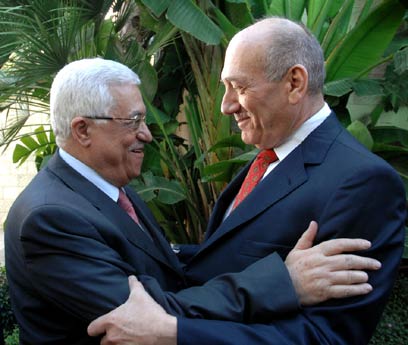
Former Prime Minister Ehud Olmert continued to make bold political statements this week, all while his future in politics remains murky. Speaking at Columbia University in New York on Thursday, the former prime minister asserted that Israel must reach an agreement with the Palestinians within four years, and that direct talks are of the essence.
According to an Israeli who attended the lecture but did not want to be identified, Olmert said he believes the conflict with the Palestinians is the most important issue on the agenda ahead of the Israeli elections, and stressed that in order for a peace agreement to be made, the prime minister of Israel must be personally involved in the negotiations instead of sending emissaries.
Related stories:
- State appeals Olmert acquittal
- Olmert: Netanyahu broke the rules in US elections
- What does Obama have in store for 2nd term?
Referring to the newly reelected President Barack Obama, Olmert stressed that the Jewish state "has a friend in the White House," but suggested the friendship does not extend to Prime Minister Benjamin Netanyahu personally.

Olmert with Abbas (Archive photo: Moshe Milner, GPO)
Olmert spoke lengthily about his own attempts to reach a peace deal with Palestinian President Mahmoud Abbas, saying that the latter "never said yes, but never said no, either." Olmert quoted Abbas as saying at the time that Israel and the Palestinians were two months away from an agreement.
4 years left to make deal
Postulating that the international community will not stand Israeli control over the Palestinians for much longer, Olmert said that the accords must be completed within the next four years.
Olmert further said that "time is running out for us, not the Palestinians," warning that if a two-state solution is not instated, Israel runs the risk of becoming a binational state with a Palestinian majority.
Answering questions from the audience about his intentions to reenter the political arena, Olmert said he will announce his plans upon returning to Israel in the coming days. He expressed hope he could make a difference, but refused to specify in what capacity.
He did not explicitly address being cleared of a variety of corruption charges, an acquittal that is now being contested by the State Prosecutor's Office.
Addressing the civil war in Syria, Olmert said that as prime minister he attempted to start talks with the authorities in the neighboring country, but the initiative failed. He speculated that it won't be long before President Bashar Assad falls.
Moving on to the Iraniannuclear threat, the former leader said that the solution lies in a collaboration with the international community, and not in a unilateral Israeli effort.
- Receive Ynetnews updates
directly to your desktop















